BUS300: Governance, Sustainability, and Ethics Presentation Analysis
VerifiedAdded on 2022/09/28
|12
|1169
|22
Presentation
AI Summary
This presentation delves into the realm of corporate governance, sustainability, and ethics, examining the motivations behind corporate information disclosure. It explores key theoretical frameworks such as Stakeholder Theory, Corporate Social Responsibility (CSR), and the Triple Bottom Line, analyzing their implications for business practices. The presentation argues for the Stakeholder Theory's persuasiveness and highlights the interconnectedness between CSR reporting and environmental responsibility. It also examines the role of the Triple Bottom Line in driving other bottom lines, such as economic, social, and environmental measures, all of which are integral to sustainability. The conclusion emphasizes the shift of business entities towards meeting sustainability objectives through various theoretical frameworks. The presentation includes references using the Harvard Referencing Style.
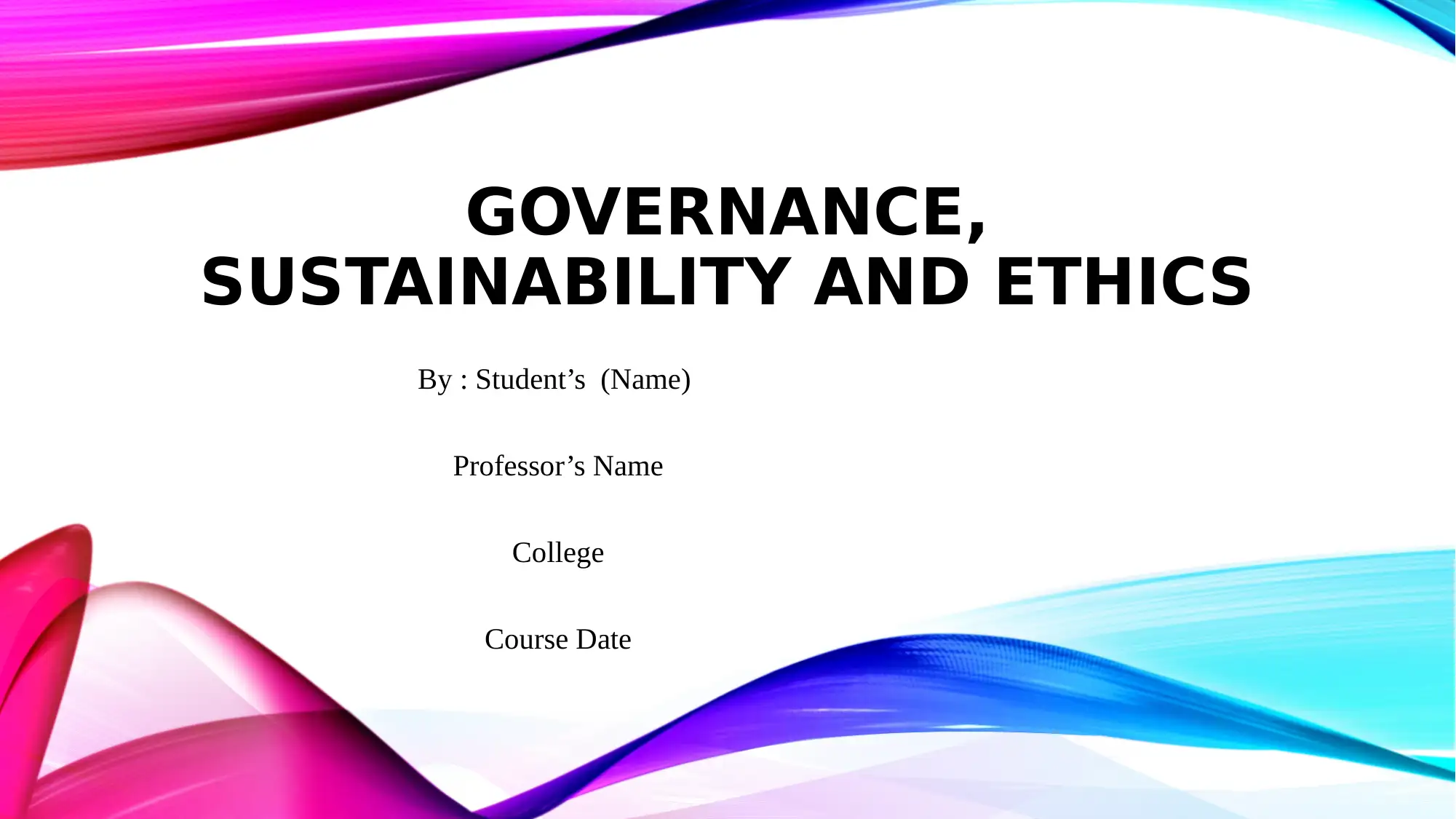
GOVERNANCE,
SUSTAINABILITY AND ETHICS
By : Student’s (Name)
Professor’s Name
College
Course Date
SUSTAINABILITY AND ETHICS
By : Student’s (Name)
Professor’s Name
College
Course Date
Paraphrase This Document
Need a fresh take? Get an instant paraphrase of this document with our AI Paraphraser
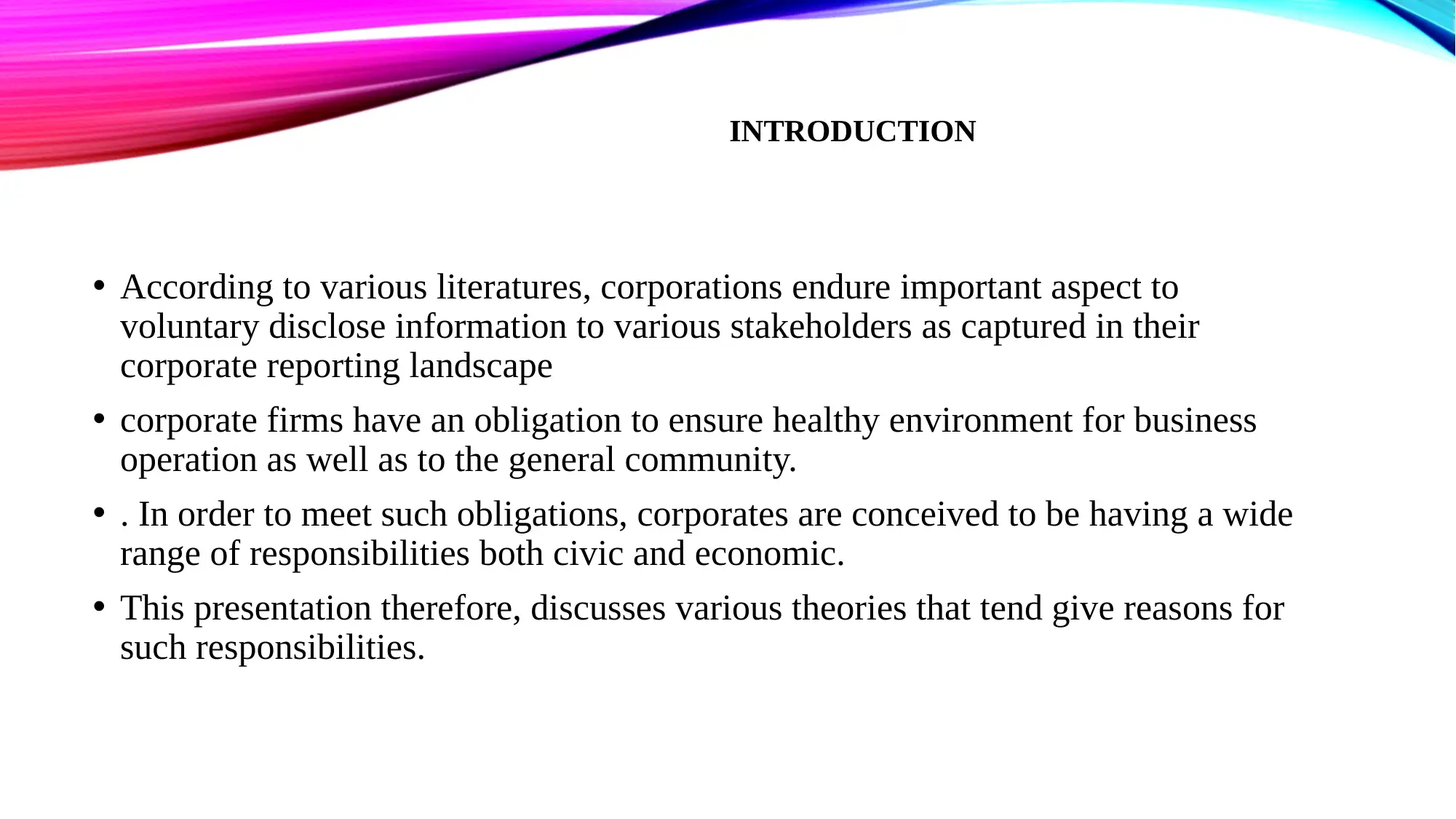
INTRODUCTION
• According to various literatures, corporations endure important aspect to
voluntary disclose information to various stakeholders as captured in their
corporate reporting landscape
• corporate firms have an obligation to ensure healthy environment for business
operation as well as to the general community.
• . In order to meet such obligations, corporates are conceived to be having a wide
range of responsibilities both civic and economic.
• This presentation therefore, discusses various theories that tend give reasons for
such responsibilities.
• According to various literatures, corporations endure important aspect to
voluntary disclose information to various stakeholders as captured in their
corporate reporting landscape
• corporate firms have an obligation to ensure healthy environment for business
operation as well as to the general community.
• . In order to meet such obligations, corporates are conceived to be having a wide
range of responsibilities both civic and economic.
• This presentation therefore, discusses various theories that tend give reasons for
such responsibilities.
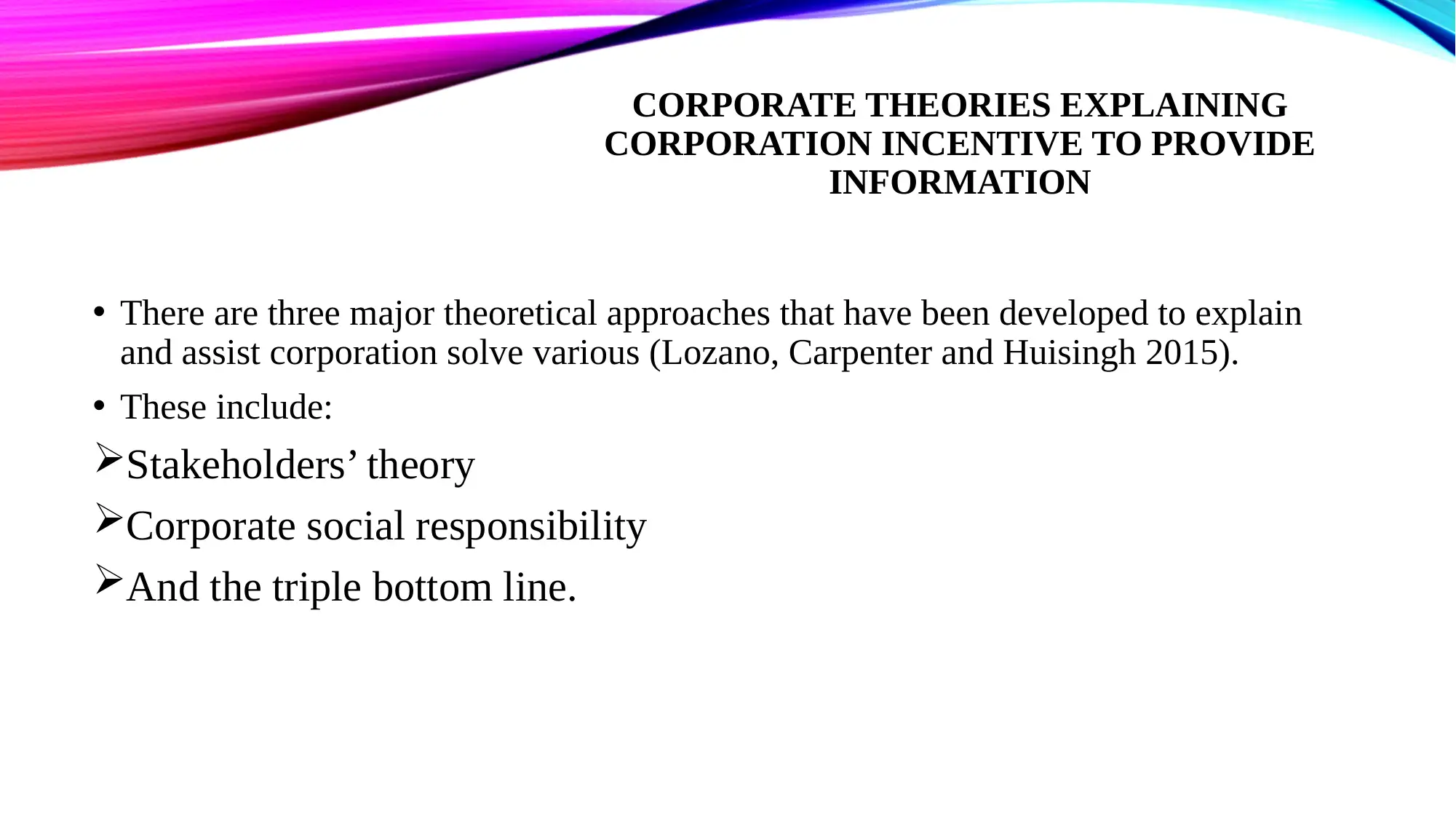
CORPORATE THEORIES EXPLAINING
CORPORATION INCENTIVE TO PROVIDE
INFORMATION
• There are three major theoretical approaches that have been developed to explain
and assist corporation solve various (Lozano, Carpenter and Huisingh 2015).
• These include:
Stakeholders’ theory
Corporate social responsibility
And the triple bottom line.
CORPORATION INCENTIVE TO PROVIDE
INFORMATION
• There are three major theoretical approaches that have been developed to explain
and assist corporation solve various (Lozano, Carpenter and Huisingh 2015).
• These include:
Stakeholders’ theory
Corporate social responsibility
And the triple bottom line.
⊘ This is a preview!⊘
Do you want full access?
Subscribe today to unlock all pages.

Trusted by 1+ million students worldwide
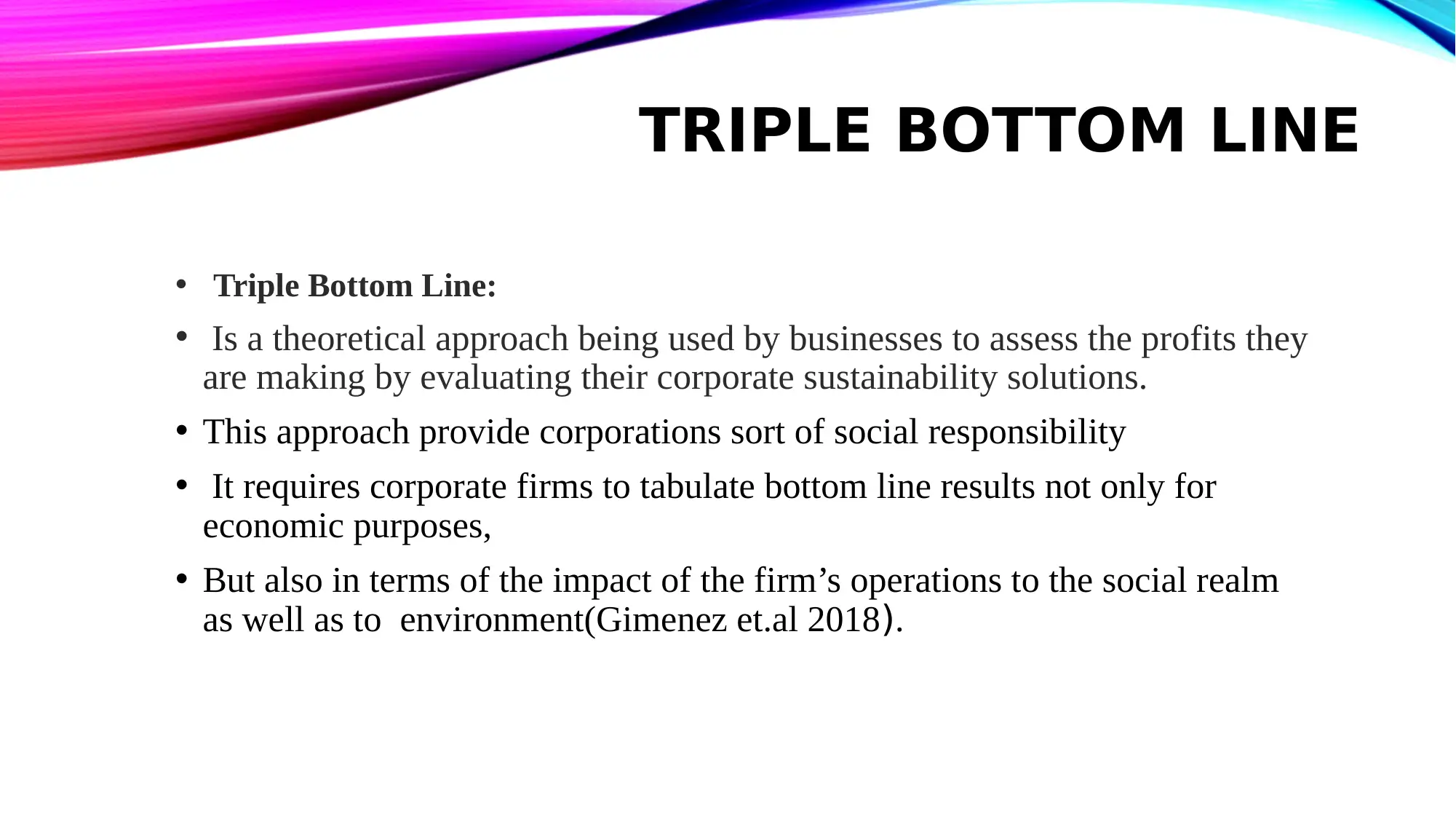
TRIPLE BOTTOM LINE
• Triple Bottom Line:
• Is a theoretical approach being used by businesses to assess the profits they
are making by evaluating their corporate sustainability solutions.
• This approach provide corporations sort of social responsibility
• It requires corporate firms to tabulate bottom line results not only for
economic purposes,
• But also in terms of the impact of the firm’s operations to the social realm
as well as to environment(Gimenez et.al 2018).
• Triple Bottom Line:
• Is a theoretical approach being used by businesses to assess the profits they
are making by evaluating their corporate sustainability solutions.
• This approach provide corporations sort of social responsibility
• It requires corporate firms to tabulate bottom line results not only for
economic purposes,
• But also in terms of the impact of the firm’s operations to the social realm
as well as to environment(Gimenez et.al 2018).
Paraphrase This Document
Need a fresh take? Get an instant paraphrase of this document with our AI Paraphraser
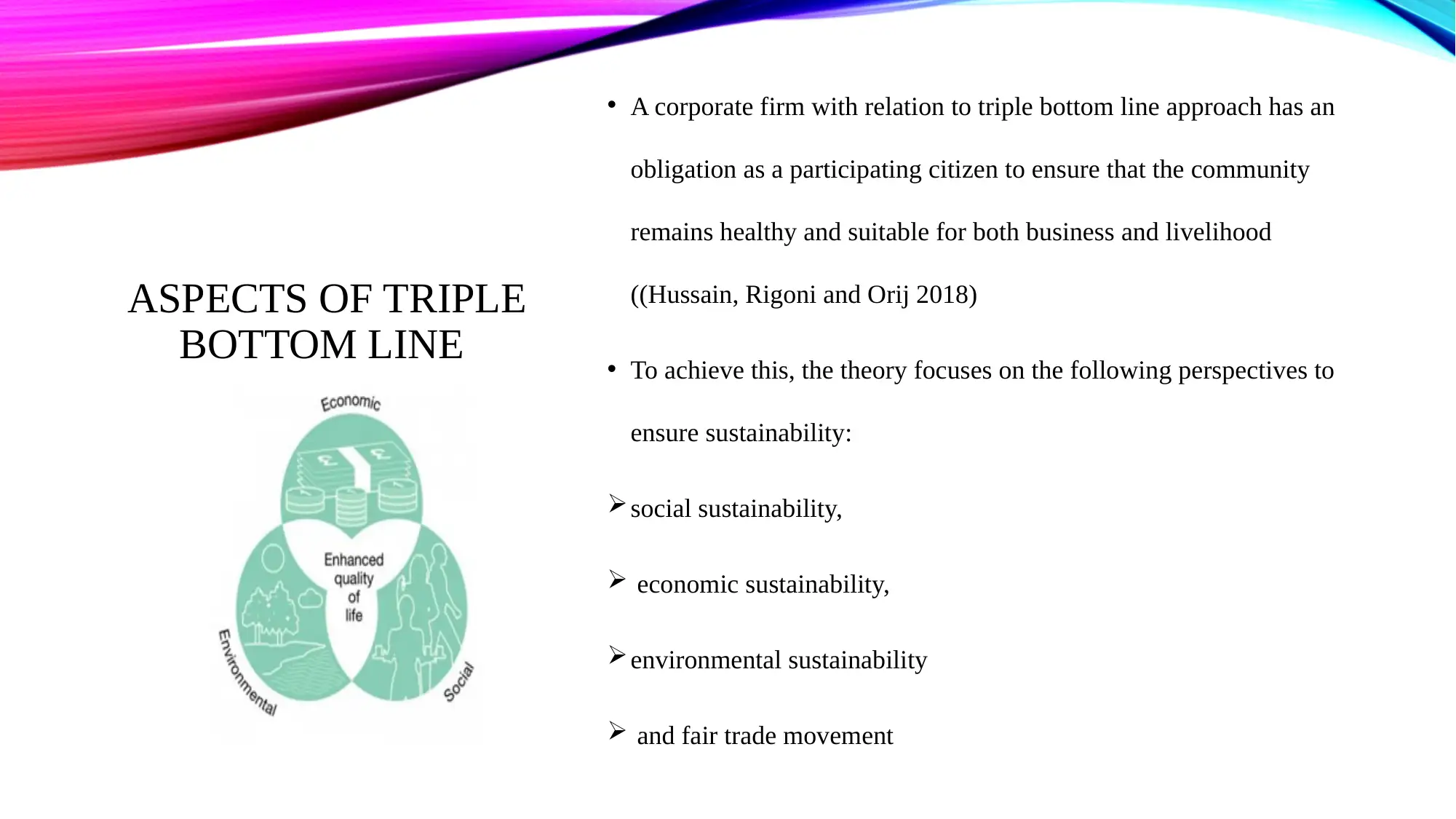
ASPECTS OF TRIPLE
BOTTOM LINE
• A corporate firm with relation to triple bottom line approach has an
obligation as a participating citizen to ensure that the community
remains healthy and suitable for both business and livelihood
((Hussain, Rigoni and Orij 2018)
• To achieve this, the theory focuses on the following perspectives to
ensure sustainability:
social sustainability,
economic sustainability,
environmental sustainability
and fair trade movement
BOTTOM LINE
• A corporate firm with relation to triple bottom line approach has an
obligation as a participating citizen to ensure that the community
remains healthy and suitable for both business and livelihood
((Hussain, Rigoni and Orij 2018)
• To achieve this, the theory focuses on the following perspectives to
ensure sustainability:
social sustainability,
economic sustainability,
environmental sustainability
and fair trade movement
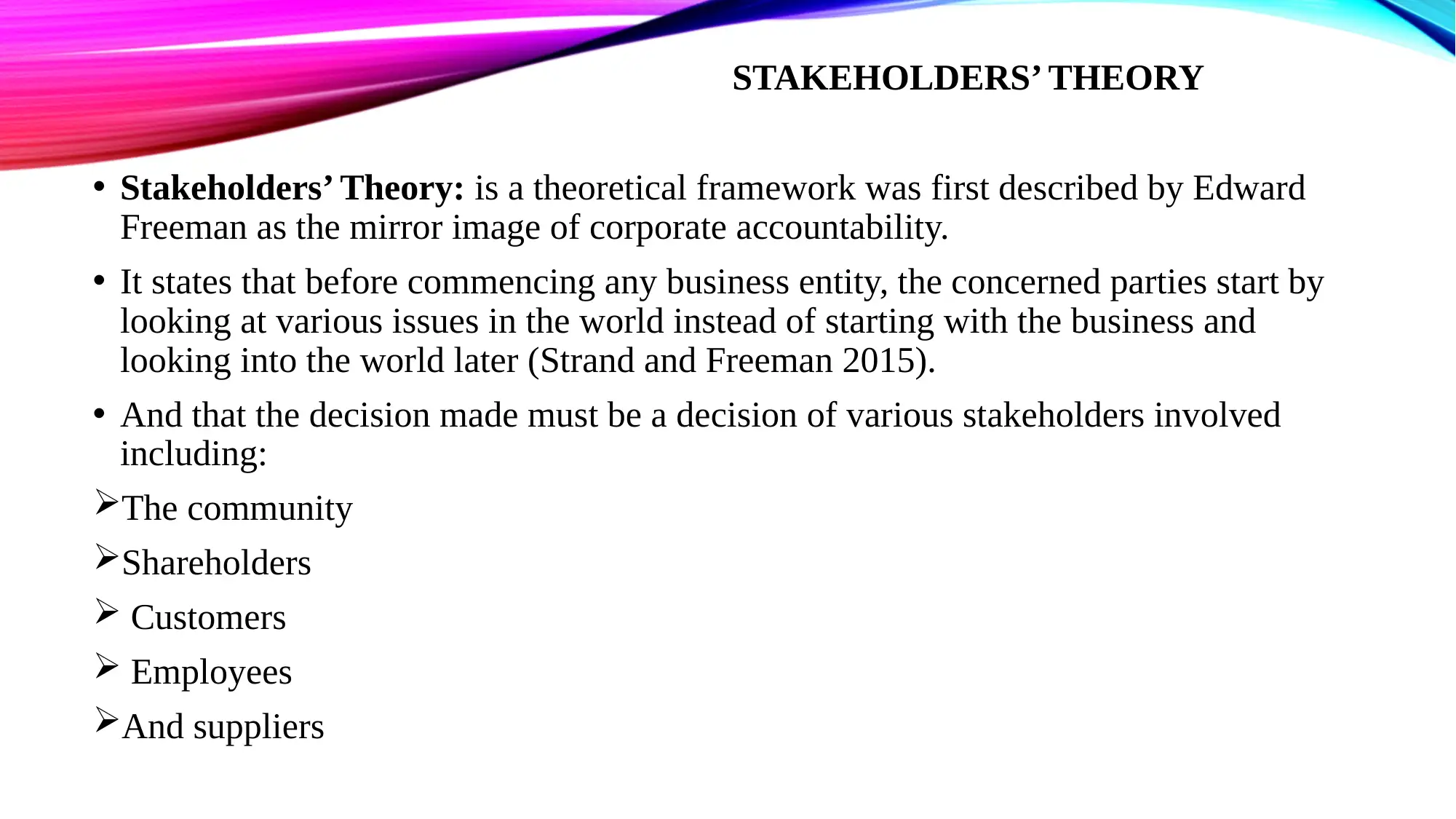
STAKEHOLDERS’ THEORY
• Stakeholders’ Theory: is a theoretical framework was first described by Edward
Freeman as the mirror image of corporate accountability.
• It states that before commencing any business entity, the concerned parties start by
looking at various issues in the world instead of starting with the business and
looking into the world later (Strand and Freeman 2015).
• And that the decision made must be a decision of various stakeholders involved
including:
The community
Shareholders
Customers
Employees
And suppliers
• Stakeholders’ Theory: is a theoretical framework was first described by Edward
Freeman as the mirror image of corporate accountability.
• It states that before commencing any business entity, the concerned parties start by
looking at various issues in the world instead of starting with the business and
looking into the world later (Strand and Freeman 2015).
• And that the decision made must be a decision of various stakeholders involved
including:
The community
Shareholders
Customers
Employees
And suppliers
⊘ This is a preview!⊘
Do you want full access?
Subscribe today to unlock all pages.

Trusted by 1+ million students worldwide
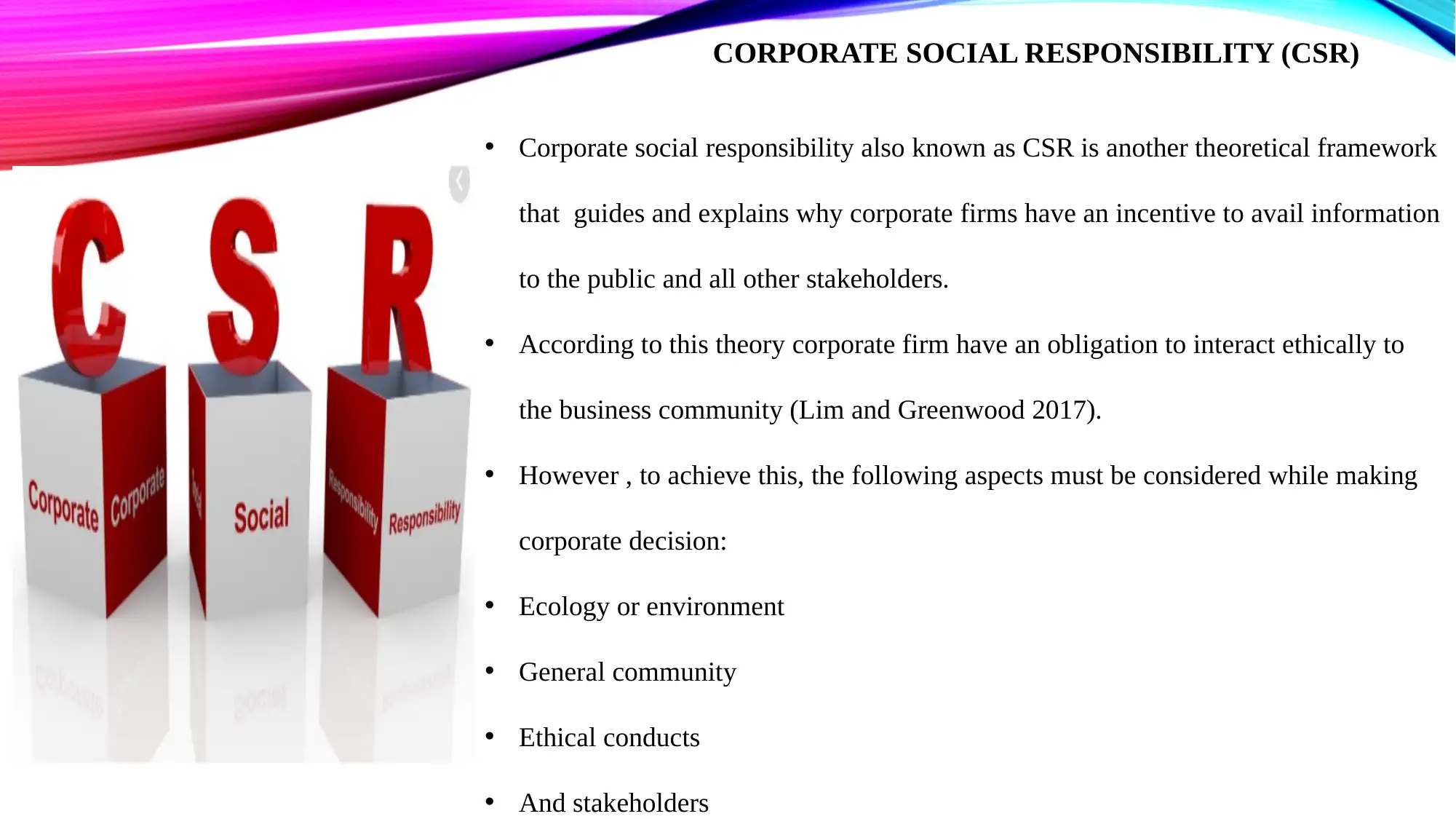
CORPORATE SOCIAL RESPONSIBILITY (CSR)
• Corporate social responsibility also known as CSR is another theoretical framework
that guides and explains why corporate firms have an incentive to avail information
to the public and all other stakeholders.
• According to this theory corporate firm have an obligation to interact ethically to
the business community (Lim and Greenwood 2017).
• However , to achieve this, the following aspects must be considered while making
corporate decision:
• Ecology or environment
• General community
• Ethical conducts
• And stakeholders
• Corporate social responsibility also known as CSR is another theoretical framework
that guides and explains why corporate firms have an incentive to avail information
to the public and all other stakeholders.
• According to this theory corporate firm have an obligation to interact ethically to
the business community (Lim and Greenwood 2017).
• However , to achieve this, the following aspects must be considered while making
corporate decision:
• Ecology or environment
• General community
• Ethical conducts
• And stakeholders
Paraphrase This Document
Need a fresh take? Get an instant paraphrase of this document with our AI Paraphraser
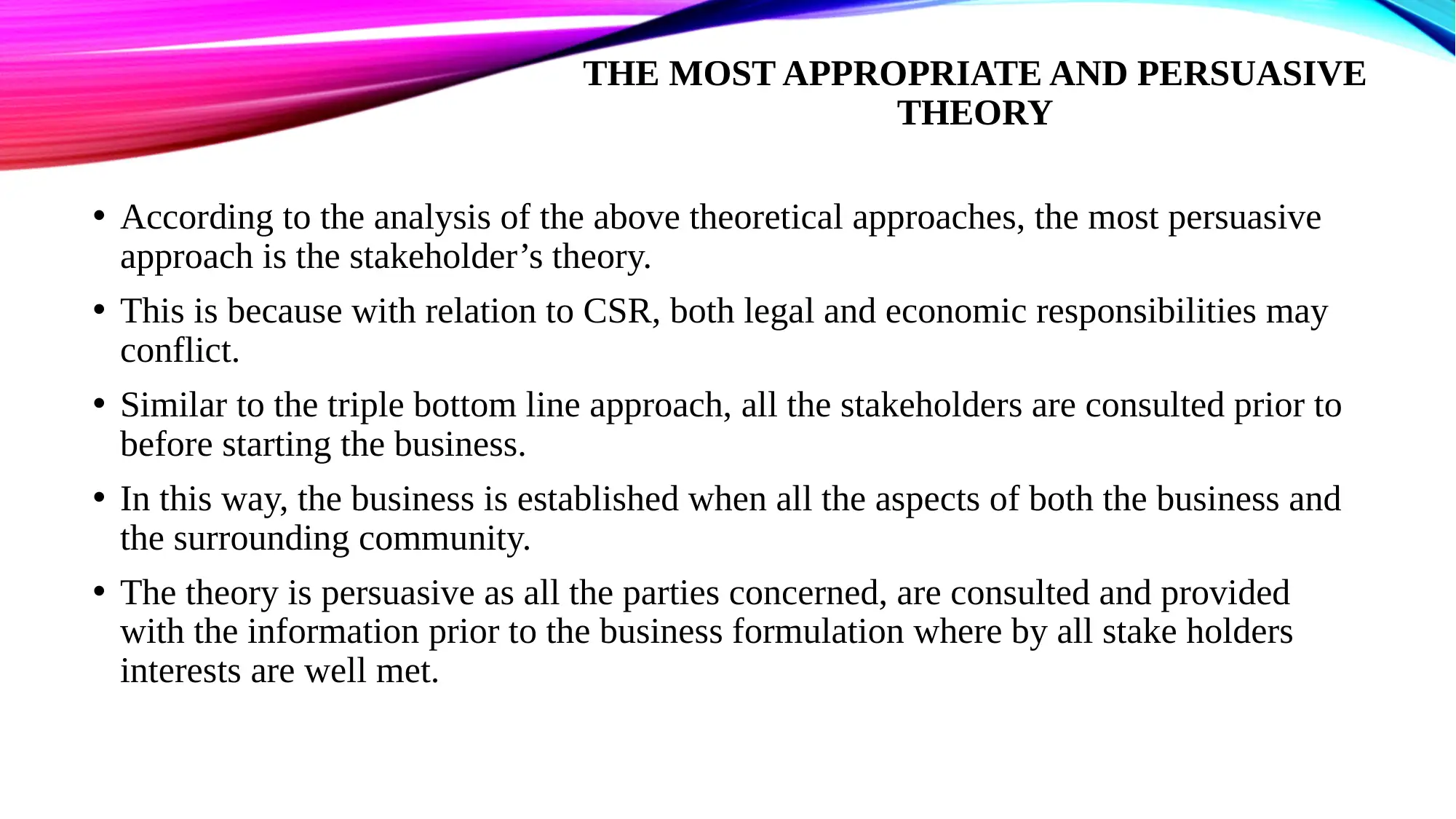
THE MOST APPROPRIATE AND PERSUASIVE
THEORY
• According to the analysis of the above theoretical approaches, the most persuasive
approach is the stakeholder’s theory.
• This is because with relation to CSR, both legal and economic responsibilities may
conflict.
• Similar to the triple bottom line approach, all the stakeholders are consulted prior to
before starting the business.
• In this way, the business is established when all the aspects of both the business and
the surrounding community.
• The theory is persuasive as all the parties concerned, are consulted and provided
with the information prior to the business formulation where by all stake holders
interests are well met.
THEORY
• According to the analysis of the above theoretical approaches, the most persuasive
approach is the stakeholder’s theory.
• This is because with relation to CSR, both legal and economic responsibilities may
conflict.
• Similar to the triple bottom line approach, all the stakeholders are consulted prior to
before starting the business.
• In this way, the business is established when all the aspects of both the business and
the surrounding community.
• The theory is persuasive as all the parties concerned, are consulted and provided
with the information prior to the business formulation where by all stake holders
interests are well met.
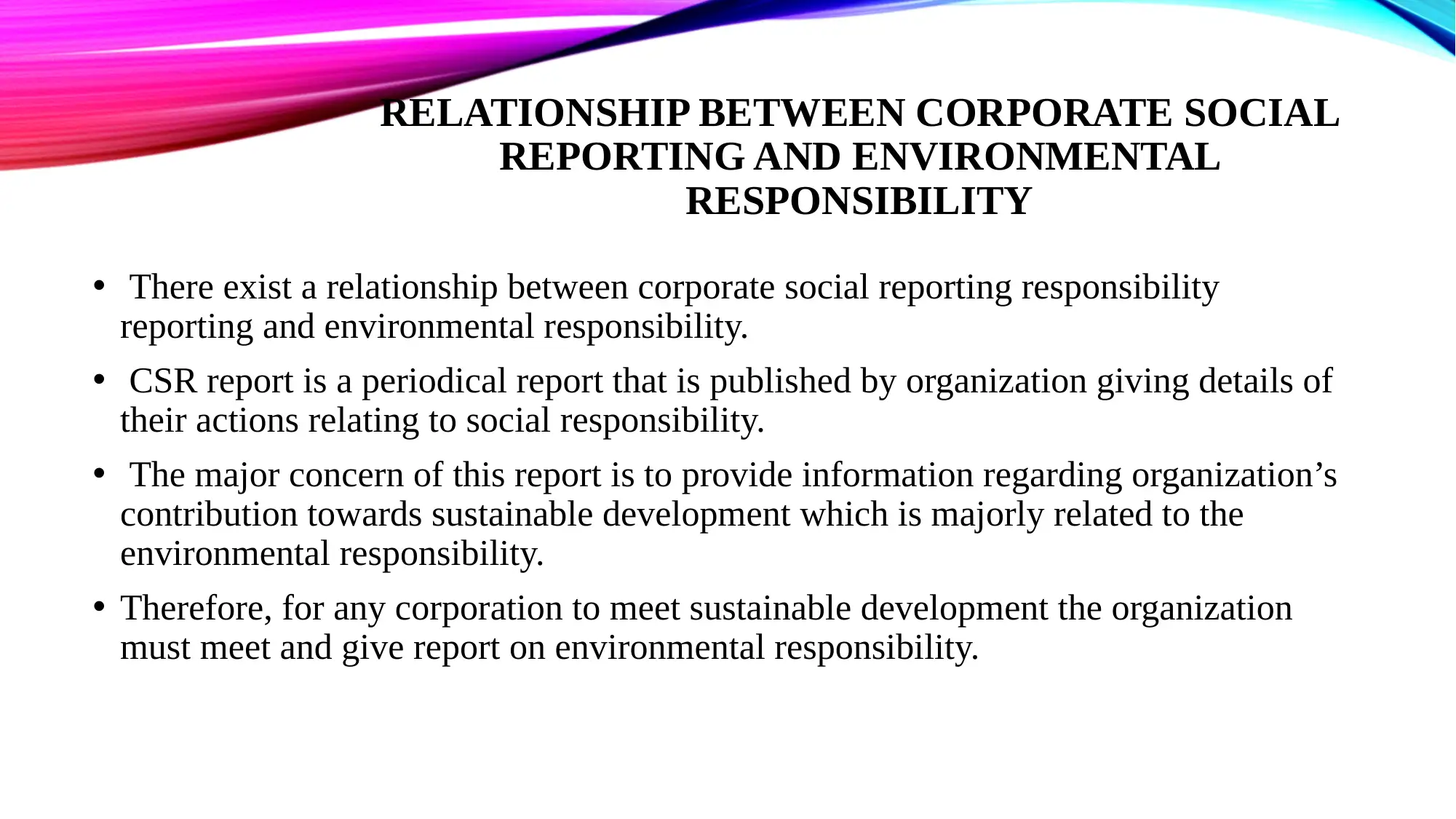
RELATIONSHIP BETWEEN CORPORATE SOCIAL
REPORTING AND ENVIRONMENTAL
RESPONSIBILITY
• There exist a relationship between corporate social reporting responsibility
reporting and environmental responsibility.
• CSR report is a periodical report that is published by organization giving details of
their actions relating to social responsibility.
• The major concern of this report is to provide information regarding organization’s
contribution towards sustainable development which is majorly related to the
environmental responsibility.
• Therefore, for any corporation to meet sustainable development the organization
must meet and give report on environmental responsibility.
REPORTING AND ENVIRONMENTAL
RESPONSIBILITY
• There exist a relationship between corporate social reporting responsibility
reporting and environmental responsibility.
• CSR report is a periodical report that is published by organization giving details of
their actions relating to social responsibility.
• The major concern of this report is to provide information regarding organization’s
contribution towards sustainable development which is majorly related to the
environmental responsibility.
• Therefore, for any corporation to meet sustainable development the organization
must meet and give report on environmental responsibility.
⊘ This is a preview!⊘
Do you want full access?
Subscribe today to unlock all pages.

Trusted by 1+ million students worldwide
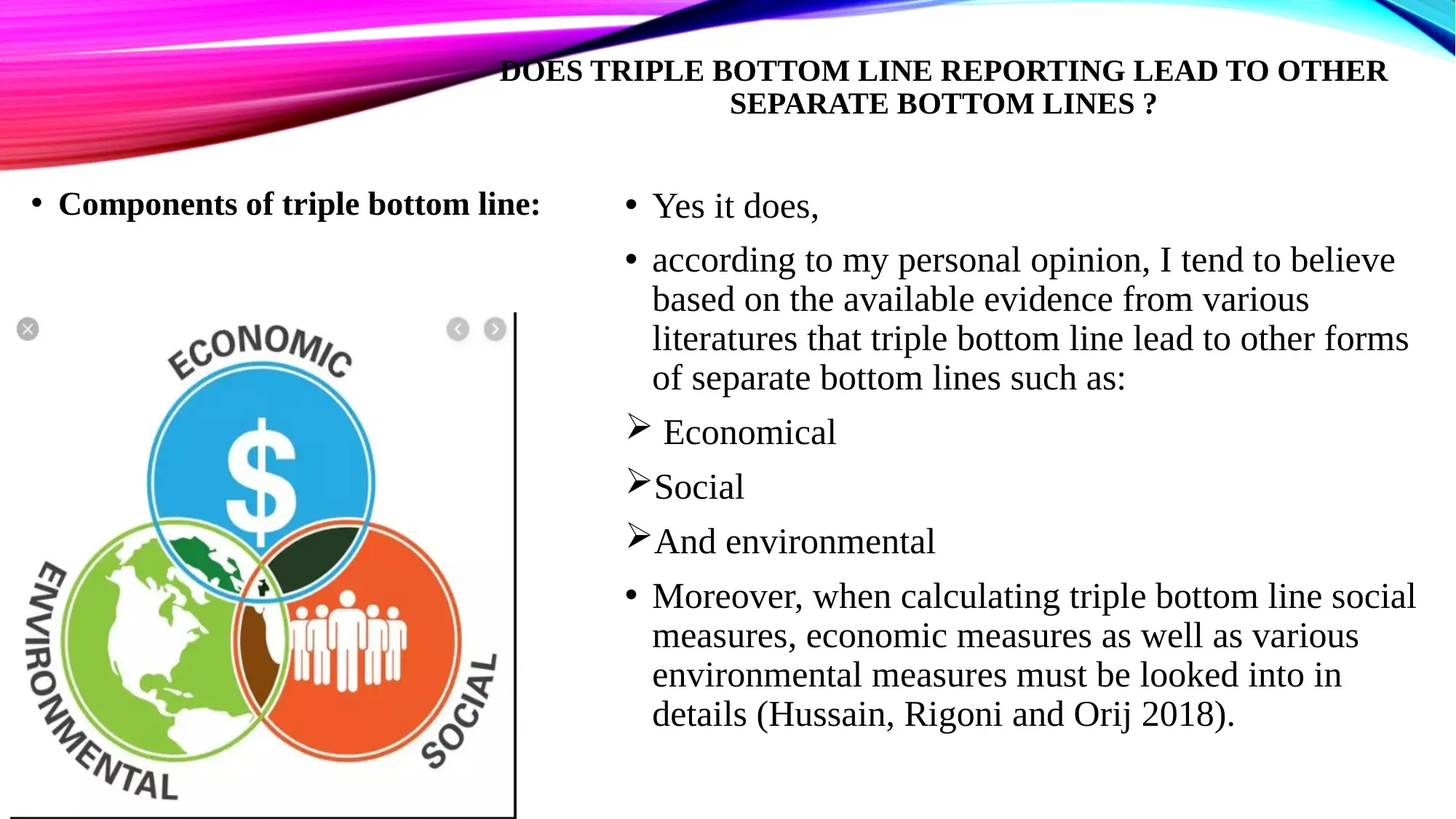
DOES TRIPLE BOTTOM LINE REPORTING LEAD TO OTHER
SEPARATE BOTTOM LINES ?
• Components of triple bottom line: • Yes it does,
• according to my personal opinion, I tend to believe
based on the available evidence from various
literatures that triple bottom line lead to other forms
of separate bottom lines such as:
Economical
Social
And environmental
• Moreover, when calculating triple bottom line social
measures, economic measures as well as various
environmental measures must be looked into in
details (Hussain, Rigoni and Orij 2018).
SEPARATE BOTTOM LINES ?
• Components of triple bottom line: • Yes it does,
• according to my personal opinion, I tend to believe
based on the available evidence from various
literatures that triple bottom line lead to other forms
of separate bottom lines such as:
Economical
Social
And environmental
• Moreover, when calculating triple bottom line social
measures, economic measures as well as various
environmental measures must be looked into in
details (Hussain, Rigoni and Orij 2018).
Paraphrase This Document
Need a fresh take? Get an instant paraphrase of this document with our AI Paraphraser
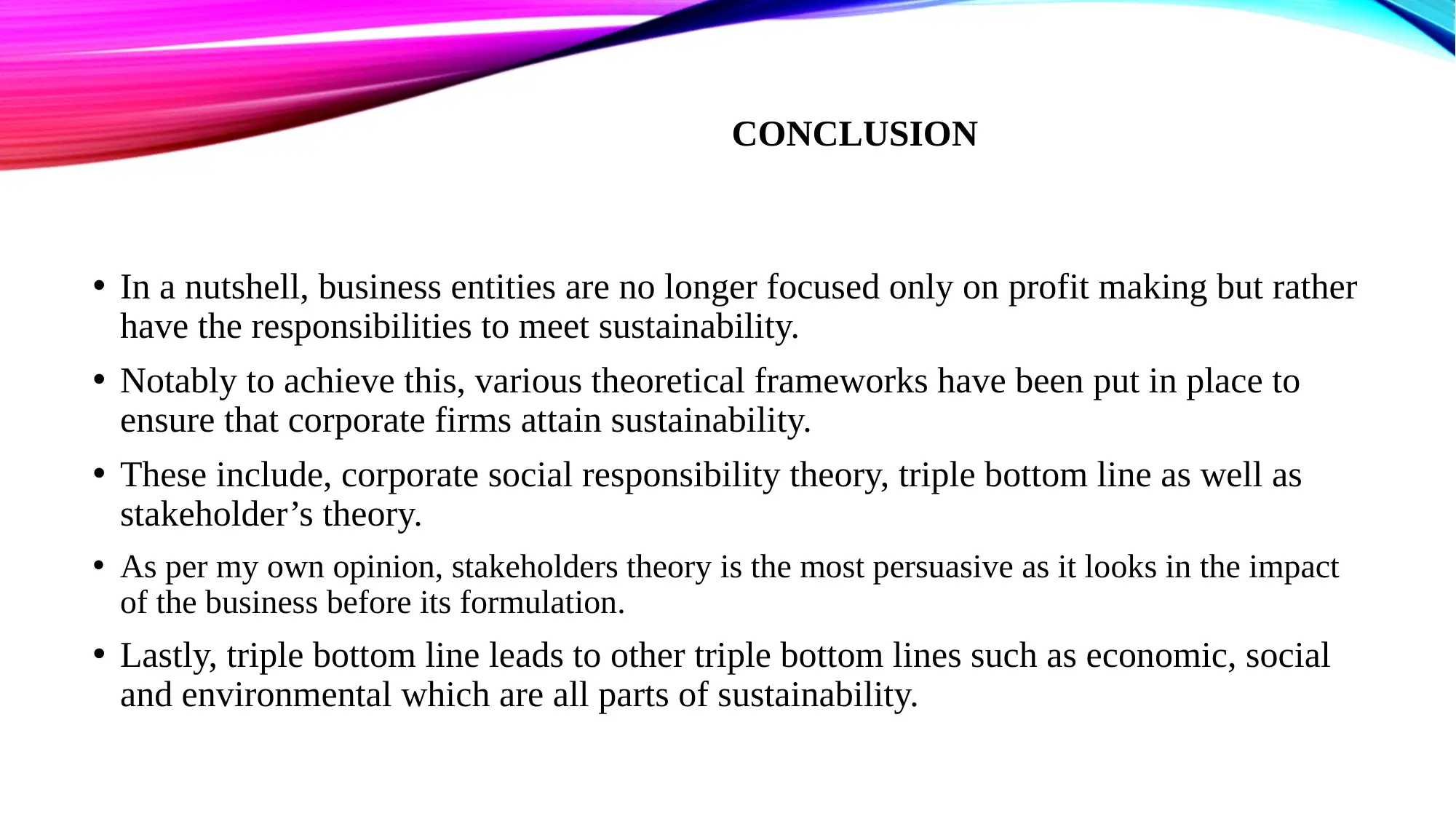
CONCLUSION
• In a nutshell, business entities are no longer focused only on profit making but rather
have the responsibilities to meet sustainability.
• Notably to achieve this, various theoretical frameworks have been put in place to
ensure that corporate firms attain sustainability.
• These include, corporate social responsibility theory, triple bottom line as well as
stakeholder’s theory.
• As per my own opinion, stakeholders theory is the most persuasive as it looks in the impact
of the business before its formulation.
• Lastly, triple bottom line leads to other triple bottom lines such as economic, social
and environmental which are all parts of sustainability.
• In a nutshell, business entities are no longer focused only on profit making but rather
have the responsibilities to meet sustainability.
• Notably to achieve this, various theoretical frameworks have been put in place to
ensure that corporate firms attain sustainability.
• These include, corporate social responsibility theory, triple bottom line as well as
stakeholder’s theory.
• As per my own opinion, stakeholders theory is the most persuasive as it looks in the impact
of the business before its formulation.
• Lastly, triple bottom line leads to other triple bottom lines such as economic, social
and environmental which are all parts of sustainability.
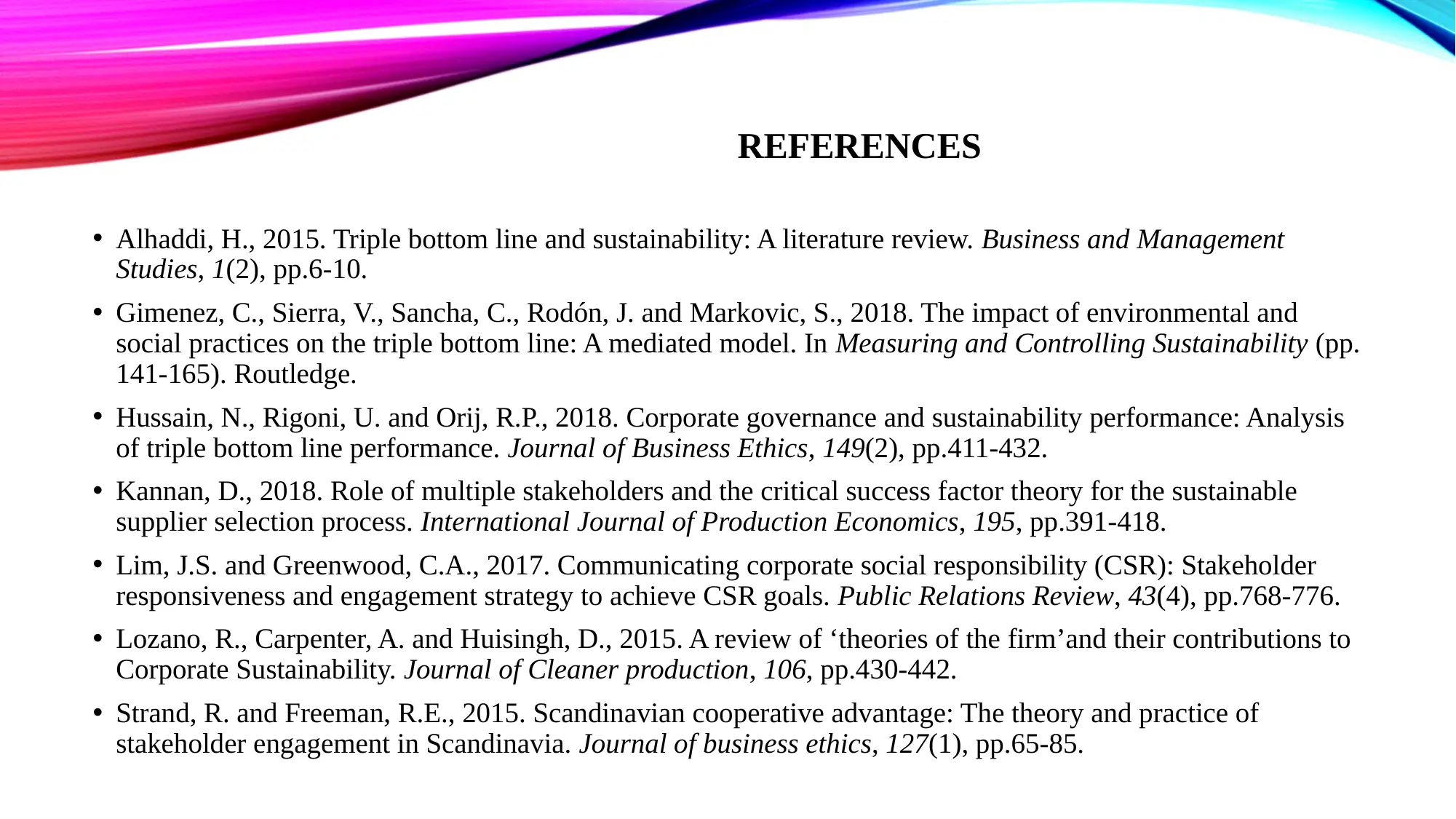
REFERENCES
• Alhaddi, H., 2015. Triple bottom line and sustainability: A literature review. Business and Management
Studies, 1(2), pp.6-10.
• Gimenez, C., Sierra, V., Sancha, C., Rodón, J. and Markovic, S., 2018. The impact of environmental and
social practices on the triple bottom line: A mediated model. In Measuring and Controlling Sustainability (pp.
141-165). Routledge.
• Hussain, N., Rigoni, U. and Orij, R.P., 2018. Corporate governance and sustainability performance: Analysis
of triple bottom line performance. Journal of Business Ethics, 149(2), pp.411-432.
• Kannan, D., 2018. Role of multiple stakeholders and the critical success factor theory for the sustainable
supplier selection process. International Journal of Production Economics, 195, pp.391-418.
• Lim, J.S. and Greenwood, C.A., 2017. Communicating corporate social responsibility (CSR): Stakeholder
responsiveness and engagement strategy to achieve CSR goals. Public Relations Review, 43(4), pp.768-776.
• Lozano, R., Carpenter, A. and Huisingh, D., 2015. A review of ‘theories of the firm’and their contributions to
Corporate Sustainability. Journal of Cleaner production, 106, pp.430-442.
• Strand, R. and Freeman, R.E., 2015. Scandinavian cooperative advantage: The theory and practice of
stakeholder engagement in Scandinavia. Journal of business ethics, 127(1), pp.65-85.
• Alhaddi, H., 2015. Triple bottom line and sustainability: A literature review. Business and Management
Studies, 1(2), pp.6-10.
• Gimenez, C., Sierra, V., Sancha, C., Rodón, J. and Markovic, S., 2018. The impact of environmental and
social practices on the triple bottom line: A mediated model. In Measuring and Controlling Sustainability (pp.
141-165). Routledge.
• Hussain, N., Rigoni, U. and Orij, R.P., 2018. Corporate governance and sustainability performance: Analysis
of triple bottom line performance. Journal of Business Ethics, 149(2), pp.411-432.
• Kannan, D., 2018. Role of multiple stakeholders and the critical success factor theory for the sustainable
supplier selection process. International Journal of Production Economics, 195, pp.391-418.
• Lim, J.S. and Greenwood, C.A., 2017. Communicating corporate social responsibility (CSR): Stakeholder
responsiveness and engagement strategy to achieve CSR goals. Public Relations Review, 43(4), pp.768-776.
• Lozano, R., Carpenter, A. and Huisingh, D., 2015. A review of ‘theories of the firm’and their contributions to
Corporate Sustainability. Journal of Cleaner production, 106, pp.430-442.
• Strand, R. and Freeman, R.E., 2015. Scandinavian cooperative advantage: The theory and practice of
stakeholder engagement in Scandinavia. Journal of business ethics, 127(1), pp.65-85.
⊘ This is a preview!⊘
Do you want full access?
Subscribe today to unlock all pages.

Trusted by 1+ million students worldwide
1 out of 12
Related Documents
Your All-in-One AI-Powered Toolkit for Academic Success.
+13062052269
info@desklib.com
Available 24*7 on WhatsApp / Email
![[object Object]](/_next/static/media/star-bottom.7253800d.svg)
Unlock your academic potential
Copyright © 2020–2026 A2Z Services. All Rights Reserved. Developed and managed by ZUCOL.





